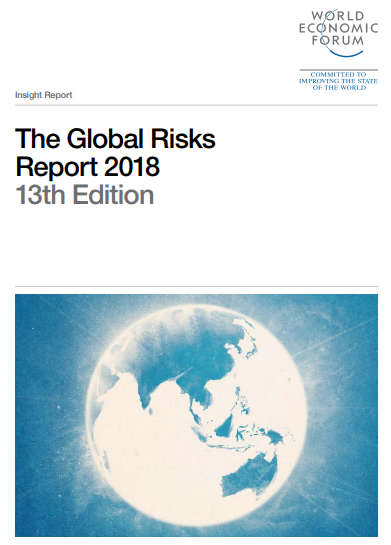World Economic Forum says innovation key to solving global water challenges
- August 31, 2018
- Posted by: administrator
- Category: Environmental, Global

With 2018 on track to be the fourth hottest year on record, heatwaves, drought, wildfires, floods and monsoons, the World Economic Forum is highlighting the need for technology innovation combined with innovation in partnerships, business models and financing.
This year’s extreme weather events underscore the findings of the World Economic Forum’s (WEF) 2018 Global Risks Report, which identified global risks with the highest likelihood and impact over the coming decade. Of these identified risks all but one can be linked to water and WEF is questioning whether stakeholders trying to solve water quantity and quality risks with the same old toolkit.
Fourth Industrial Revolution will fundamentally disrupt the status quo in water
In WEF’s view technical advancements and new capabilities emerging from the Fourth Industrial Revolution will fundamentally disrupt the status quo and spark new ways of solving global water challenges.
The Forum cites encouraging findings from other sectors – including the electricity sector, where technology-enabled smart buildings and grids, micro-grids and renewables have transformed the provision of cost-effective electricity in emerging and developed economies.
According to WEF, the water sector is only now in the early stages of understanding the possibilities brought about by the Fourth Industrial Revolution to create smart and resilient businesses, communities, cities and nations.
However, advanced technologies alone will not solve the challenge – solutions must also be designed with the engagement and commitment of diverse stakeholders from other sectors who can be mobilized by entrepreneurial programmes, such as prize competitions and crowdsourcing solutions.
Other sectors have learned that technology innovation alone is not enough and innovation in Fourth Industrial Revolution technologies must be coupled with and enabled by innovation in partnerships, business models and financing, WEF says.
These stakeholder groups are now converging to explore how advanced technology can address the world’s water and sanitation challenges through the World Economic Forum’s Water Security Rewired platform.
With the aim of expediting the adoption and rapid expansion of new solutions, a range of new initiatives are underway within the community, including:
- Urban Water Resilience Initiative – exploring how to harness advanced technology, from artificial intelligence and machine learning, to blockchain and remote sensing, to help decision-makers at city level evaluate and solve long-standing water management challenges
- Crowdsourcing initiative – Another initiative, drawing upon the expertise of the World Bank’s Water Global Practice and the far-reaching network of SAP’s Next-gen programme, is crowdsourcing ideas from start-ups to help scale groundwater assessment solutions involving Fourth Industrial Revolution tech in emerging economies.
More new ideas and initiatives are also emerging from the individual Water Security Rewired members – for example:
The Toilet Board Coalition – works in collaboration with the European Space Agency. Currently soliciting applications from technology providers to improve remote data collection, transmission and synthesis to inform the development of next generation sanitation products and services.
Smart water network based on IoT – Multinational telecommunication company Ericsson has led a myriad of water-related projects across the world ranging from the US to Kenya. Ericsson is once again leading in the water space by crafting an entire smart water network around the Internet of Things (IoT). IoT enables inter-operable data acquisition resulting in real-time water monitoring with intel from the source of the water, its distribution throughout the network, and its final discharge into a receiving water body. By utilizing this technology, water data that has always evaded water managers will now be at their fingertips 24/7, 365 days a year.
Microsoft AI and cloud-based platform – AI for Earth – being expanded thanks to an investment of $50 million over the next five years to environmental causes perpetuated by climate change. The new environmental platform is disrupting current data analysis and management practices by utilizing data on the cloud-based platform with machine learning algorithms to fill in data gaps and provide a truly holistic understanding of water resources within a watershed.
AI capabilities can forecast events, provide precision irrigation, identify water main leaks, and, most importantly, provide water managers with affordable solutions that can be built into existing infrastructure.
WEF says that these are just a few examples of novel approaches that draw on best-in-class technology and innovative business strategies to hasten solutions to the global water crisis and move from business as usual to truly transformative solutions to water challenges.
Upcoming Financial Times Water Summit to address key issues
Many of these issues will be explored at the upcoming FT Water Summit presented by the Financial Times newspaper in association with WWF which takes places in London on 17thOctober.
WaterBriefingGlobal is media partner with the Financial Times upcoming FT Water Summit Opening the Floodgates: Unleashing Returns from Water Investments which takes place in London on 17th October 2018
Click here for further information about the Summit
Click here for details of how to register for the Summit
Click here to download the WEF 2018 Global Risks Report
